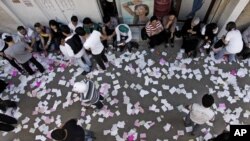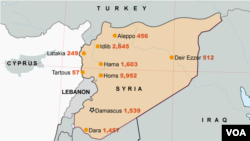Syria said more than half of eligible voters turned out for a May 7 parliamentary election boycotted by opposition groups who said it had no credibility while the government pursues a deadly crackdown on dissent.
Syrian election committee chairman Khalaf al-Izzaoui said Tuesday the voter turnout reached 51 percent, equivalent to five million people. There was no independent monitoring of the election, and opposition activists said there was little voting in towns and villages where security forces have been suppressing a 14-month long opposition uprising.
Syrian rights activists said at least seven people were killed in violence related to the uprising on Tuesday. They said a blast killed four people in the coastal town of Banias, while fighting between government and rebel forces killed three people in the eastern town of Deir el-Zour. Syrian state news agency SANA blamed the Banias explosion on armed terrorists who it says are leading the revolt.
Despite the violence, the chief of the U.N. observer mission in Syria said his team continues to have a "calming effect" on the situation in rebellious regions where it has been deployed.
Norwegian Major General Robert Mood said the mission has grown to more than 200 military monitors with the arrival of personnel from China, Indonesia, Italy and Paraguay. He also said he is "impressed by the cooperation" of all parties with the U.N. team.
But the relief group Doctors Without Borders said a team of foreign medics returning from a secret mission in Syria reported that people wounded in the uprising, and the doctors who treat them, are at risk of arrest or attack.
The group said the medics sneaked into the opposition hubs of Homs and Idlib after failing to get government permission to enter the country.
Doctors Without Borders called on all sides in the conflict to fully respect health workers, medical facilities and the wounded.
The Syria election was the first to be held since a February referendum approved a new constitution allowing the formation of new parties to compete with Syria's Baath-led coalition.
Several new parties participated in last week's vote, which the government praised as a major political reform. But, the exiled Syrian National Council opposition group dismissed the new parties as government creations.
Syrian election chief al-Izzaoui read out a list of winning candidates on Tuesday for the 250-seat parliament, which has been dominated for decades by the Baath party of Syrian President Bashar al-Assad.
The list included 30 women and one candidate who has described himself as an independent, Qadri Jamil. The Syrian official did not give a breakdown of votes by party or region.
The Syrian opposition, meanwhile, said Tuesday that its SNC has voted to extend the term of its leader Burhan Ghalioun by another three months.
The sources said Ghalioun, a secular academic, won more than half of the votes cast by members of the SNC's general secretariat at a meeting in Rome. George Sabra, another liberal, came second in the leadership contest.
Syrian Islamists have a dominant role in the SNC and have deemed Ghalioun to be an acceptable figure to the international community. SNC members also include nationalists, Kurds and independents. The opposition group has won recognition from a coalition of anti-Assad nations as a legitimate representative of the Syrian people.
But, the SNC has struggled to unify its various factions and has been plagued by personal rivalries.
The United Nations says more than 9,000 people have been killed in violence related to the anti-government uprising which erupted more than a year ago. The Syrian government has blamed armed terrorist groups for much of the country's unrest.
Syrian election committee chairman Khalaf al-Izzaoui said Tuesday the voter turnout reached 51 percent, equivalent to five million people. There was no independent monitoring of the election, and opposition activists said there was little voting in towns and villages where security forces have been suppressing a 14-month long opposition uprising.
Syrian rights activists said at least seven people were killed in violence related to the uprising on Tuesday. They said a blast killed four people in the coastal town of Banias, while fighting between government and rebel forces killed three people in the eastern town of Deir el-Zour. Syrian state news agency SANA blamed the Banias explosion on armed terrorists who it says are leading the revolt.
Despite the violence, the chief of the U.N. observer mission in Syria said his team continues to have a "calming effect" on the situation in rebellious regions where it has been deployed.
Norwegian Major General Robert Mood said the mission has grown to more than 200 military monitors with the arrival of personnel from China, Indonesia, Italy and Paraguay. He also said he is "impressed by the cooperation" of all parties with the U.N. team.
But the relief group Doctors Without Borders said a team of foreign medics returning from a secret mission in Syria reported that people wounded in the uprising, and the doctors who treat them, are at risk of arrest or attack.
The group said the medics sneaked into the opposition hubs of Homs and Idlib after failing to get government permission to enter the country.
Doctors Without Borders called on all sides in the conflict to fully respect health workers, medical facilities and the wounded.
The Syria election was the first to be held since a February referendum approved a new constitution allowing the formation of new parties to compete with Syria's Baath-led coalition.
Several new parties participated in last week's vote, which the government praised as a major political reform. But, the exiled Syrian National Council opposition group dismissed the new parties as government creations.
Syrian election chief al-Izzaoui read out a list of winning candidates on Tuesday for the 250-seat parliament, which has been dominated for decades by the Baath party of Syrian President Bashar al-Assad.
The list included 30 women and one candidate who has described himself as an independent, Qadri Jamil. The Syrian official did not give a breakdown of votes by party or region.
The Syrian opposition, meanwhile, said Tuesday that its SNC has voted to extend the term of its leader Burhan Ghalioun by another three months.
The sources said Ghalioun, a secular academic, won more than half of the votes cast by members of the SNC's general secretariat at a meeting in Rome. George Sabra, another liberal, came second in the leadership contest.
Syrian Islamists have a dominant role in the SNC and have deemed Ghalioun to be an acceptable figure to the international community. SNC members also include nationalists, Kurds and independents. The opposition group has won recognition from a coalition of anti-Assad nations as a legitimate representative of the Syrian people.
But, the SNC has struggled to unify its various factions and has been plagued by personal rivalries.
The United Nations says more than 9,000 people have been killed in violence related to the anti-government uprising which erupted more than a year ago. The Syrian government has blamed armed terrorist groups for much of the country's unrest.
Some information for this report was provided by AP, AFP and Reuters.
|
Join the conversation on our social journalism site - Middle East Voices. Follow our Middle East reports on Twitter and discuss them on our Facebook page. |






